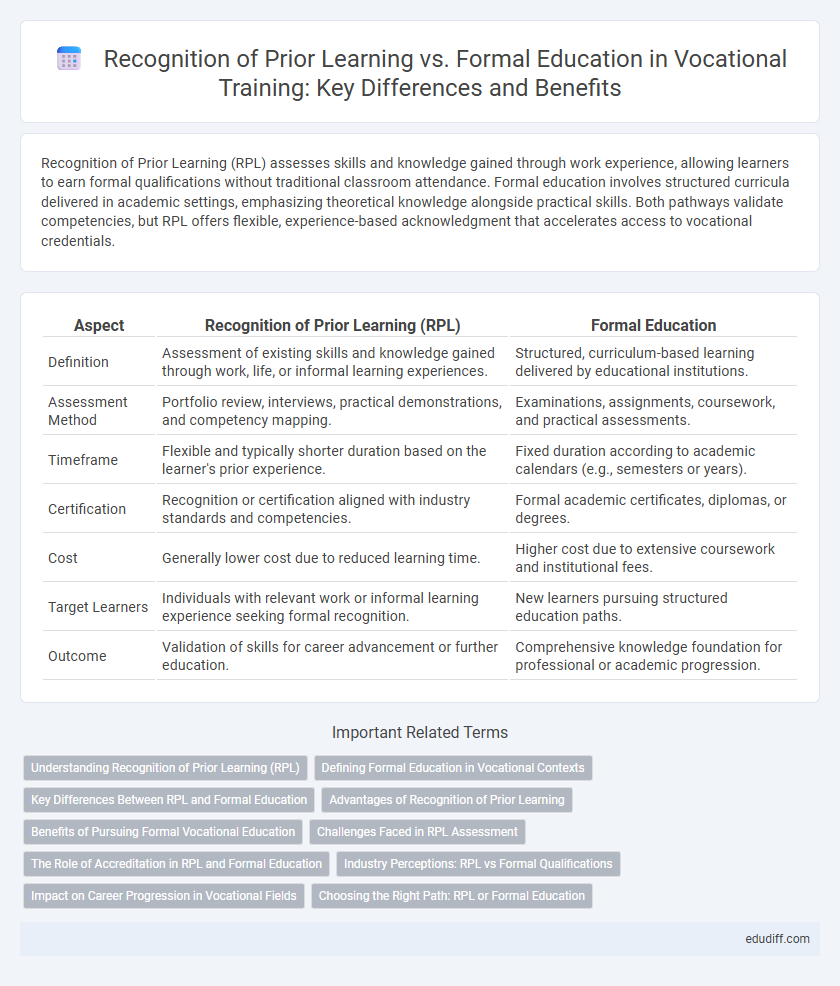Recognition of Prior Learning (RPL) assesses skills and knowledge gained through work experience, allowing learners to earn formal qualifications without traditional classroom attendance. Formal education involves structured curricula delivered in academic settings, emphasizing theoretical knowledge alongside practical skills. Both pathways validate competencies, but RPL offers flexible, experience-based acknowledgment that accelerates access to vocational credentials.
Table of Comparison
| Aspect | Recognition of Prior Learning (RPL) | Formal Education |
|---|---|---|
| Definition | Assessment of existing skills and knowledge gained through work, life, or informal learning experiences. | Structured, curriculum-based learning delivered by educational institutions. |
| Assessment Method | Portfolio review, interviews, practical demonstrations, and competency mapping. | Examinations, assignments, coursework, and practical assessments. |
| Timeframe | Flexible and typically shorter duration based on the learner's prior experience. | Fixed duration according to academic calendars (e.g., semesters or years). |
| Certification | Recognition or certification aligned with industry standards and competencies. | Formal academic certificates, diplomas, or degrees. |
| Cost | Generally lower cost due to reduced learning time. | Higher cost due to extensive coursework and institutional fees. |
| Target Learners | Individuals with relevant work or informal learning experience seeking formal recognition. | New learners pursuing structured education paths. |
| Outcome | Validation of skills for career advancement or further education. | Comprehensive knowledge foundation for professional or academic progression. |
Understanding Recognition of Prior Learning (RPL)
Recognition of Prior Learning (RPL) assesses a learner's existing skills and knowledge from informal, non-formal, or experiential sources, enabling faster qualification or credit transfer in vocational education. RPL validates competencies that are equivalent to those taught in formal education, reducing redundancy and promoting workforce readiness. This process supports lifelong learning by valuing practical experience alongside traditional academic achievements.
Defining Formal Education in Vocational Contexts
Formal education in vocational contexts refers to structured training programs delivered through accredited institutions that follow a standardized curriculum aligned with industry requirements. It encompasses classroom instruction, practical workshops, and assessments designed to equip learners with specific technical skills and knowledge for particular trades or professions. This type of education is certified by recognized authorities, ensuring consistency and credibility in skill validation across vocational sectors.
Key Differences Between RPL and Formal Education
Recognition of Prior Learning (RPL) assesses an individual's existing skills and knowledge gained through work experience, while formal education requires structured coursework and assessments in an academic setting. RPL offers a more flexible and personalized pathway to certification by validating competencies regardless of where or how they were acquired. Formal education is time-bound and standardized, often leading to widely recognized diplomas or degrees, whereas RPL accelerates credentialing by acknowledging prior learning without repeating content.
Advantages of Recognition of Prior Learning
Recognition of Prior Learning (RPL) accelerates career progression by valuing existing skills and experiences, reducing the need for repetitive training found in formal education. It offers personalized learning pathways that save time and financial resources while aligning with industry standards. Employers benefit from RPL as it ensures workforce competency through validated practical knowledge rather than solely theoretical credentials.
Benefits of Pursuing Formal Vocational Education
Formal vocational education offers structured training that aligns with industry standards, ensuring comprehensive skill development and certification recognized by employers. It provides access to experienced instructors, hands-on practice, and up-to-date resources that enhance practical knowledge beyond what Recognition of Prior Learning (RPL) can validate. This pathway increases employability, facilitates career advancement, and meets regulatory requirements often essential in specialized trades and technical professions.
Challenges Faced in RPL Assessment
Recognition of Prior Learning (RPL) assessments face significant challenges such as validating informal skills against standardized criteria and addressing inconsistencies in evidence documentation. Assessors often encounter difficulties in objectively measuring learning acquired outside formal education systems, resulting in potential biases and credibility issues. The complexity of aligning diverse experiential learning with formal qualification frameworks underscores the need for robust assessment tools and assessor training.
The Role of Accreditation in RPL and Formal Education
Accreditation ensures that Recognition of Prior Learning (RPL) and formal education meet established quality standards, validating the skills and knowledge acquired through various pathways. Accredited RPL processes provide learners with credible and recognized certification, enhancing employability and further education opportunities. In formal education, accreditation guarantees curriculum relevance, institutional credibility, and the transferability of qualifications across industries and regions.
Industry Perceptions: RPL vs Formal Qualifications
Industry perceptions often regard Recognition of Prior Learning (RPL) as a practical measure of existing skills, while formal qualifications are typically valued for their standardized curriculum and theoretical foundation. Employers in vocational sectors recognize RPL for accelerating workforce readiness but may prioritize formal education for roles requiring comprehensive technical knowledge. The challenge lies in aligning RPL assessments with industry standards to ensure consistent competence validation alongside traditional qualifications.
Impact on Career Progression in Vocational Fields
Recognition of Prior Learning (RPL) accelerates career progression in vocational fields by validating skills gained through work experience, enabling faster access to advanced qualifications and job opportunities. Unlike formal education, which follows a standardized curriculum and timeframe, RPL offers individualized pathways that recognize practical competencies, reducing time and cost barriers. Employers increasingly value RPL credentials for their emphasis on real-world expertise, enhancing employability and prospects for promotion in trades and technical professions.
Choosing the Right Path: RPL or Formal Education
Choosing between Recognition of Prior Learning (RPL) and formal education depends on career goals, available time, and existing competencies. RPL offers a fast-track qualification by validating practical skills and workplace experience, which is ideal for individuals with substantial industry knowledge. Formal education provides comprehensive theoretical foundations and structured learning pathways essential for professions requiring academic credentials or formal certification.
Recognition of Prior Learning vs Formal Education Infographic

 edudiff.com
edudiff.com